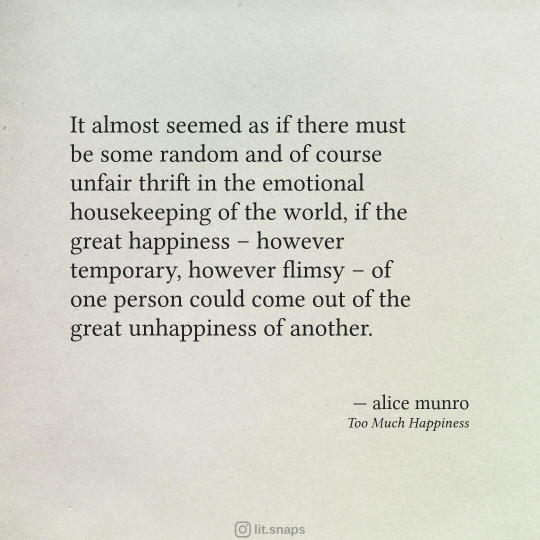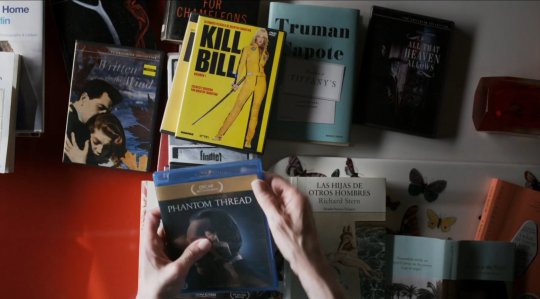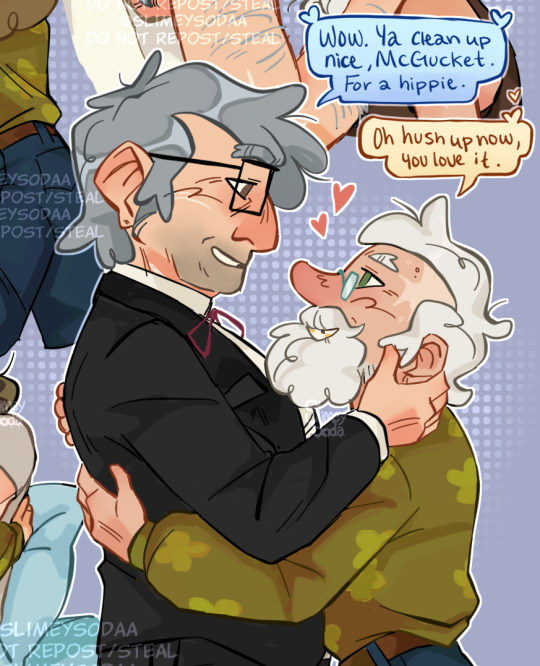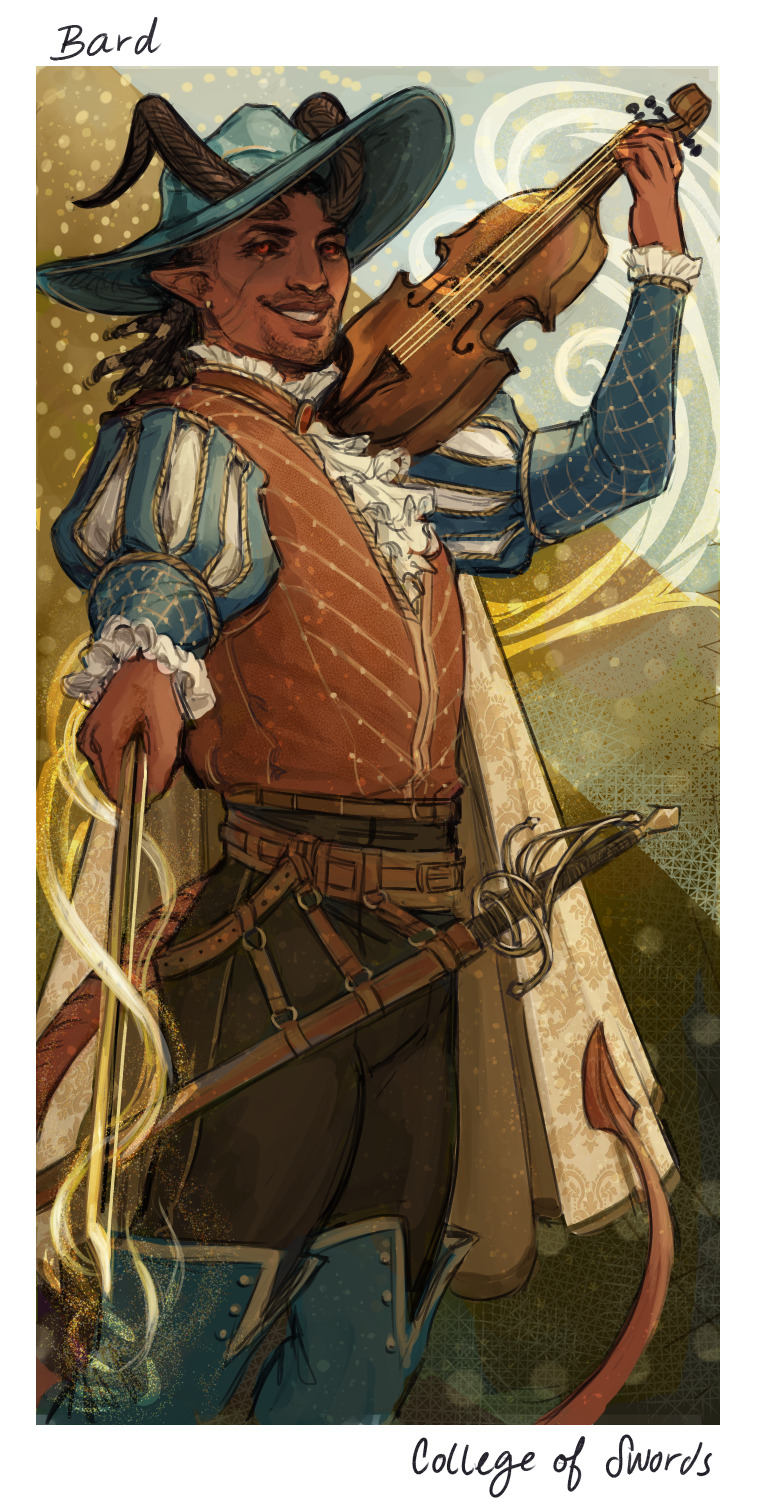#Too Much Happiness
Explore tagged Tumblr posts
Text

37 notes
·
View notes
Text

“She was learning, quite late, what many people around her appeared to have known since childhood that life can be perfectly satisfying without major achievements.”
Alice Munro, Too Much Happiness: Stories
18 notes
·
View notes
Text
some yall mad annoying bout your boyfriends that probably ugly anyways imma need yall to tag that shyt so i dont have to see it
18 notes
·
View notes
Text

In "Fiction", one of the 10 new stories collected in Too Much Happiness, a woman called Joyce takes a vague dislike to a guest at a family party. The guest, Maggie, whom Joyce thinks of as the sort of young woman "whose mission in life is to make people feel uncomfortable", turns out to be a writer who's just published her first book. Joyce buys a copy on a whim a few days later, not sure if she'll actually read it ("she has a couple of good biographies on the go at the moment"). She becomes even more unsure when she realises that it's "a collection of short stories, not a novel . . . It seems to diminish the book's authority, making the author seem like somebody who is just hanging on to the gates of Literature, rather than safely settled inside."
Alice Munro has said in interviews that she once had similar anxieties about short stories - that she spent her 20s fretting about not producing a novel. These days, along with William Trevor, she is one of the grandees of English-language short fiction. Yet people still like to worry about her authority. In truth, there's little substance to these anxieties: she's had an international readership since the 1970s; this year she added the Man Booker International prize to her already substantial collection of awards; and her daughter has published a memoir about being brought up by "an icon". Even so, there's a persistent idea of her as an underpraised housewife-genius from the Canadian backwoods, perhaps because it's easier to talk about the literary politics of being a woman, Canadian or a short-story writer than it is to give a sense of her densely packed but effortless-seeming work.
Born Alice Laidlaw in 1931, Munro grew up in a small town in southwestern Ontario peopled by descendants of Scottish and Irish settlers. (Through her father, she's descended from the Scottish Romantic writer James Hogg.) She quickly got out of there on a scholarship, married a man she met in college and started a family in suburban Vancouver. Then, not long after publishing Lives of Girls and Women (1971), a kind of bildungsroman made of interlinked stories, she got divorced and found herself back in Ontario, where the sexual and social changes in the air did not always fit well with the religious and class assumptions of small-town Canada. But there she stayed, remarrying and, in her writing, addressing the matter of men and women, trouble with children, the deaths of friends and parents. By the early 80s, it was clear that Huron County - with some excursions to the Pacific northwest - had given her all the material she would need.
Munro's localism isn't antiquarian or defensive. Small-town Canada, it turns out, is an ideal place to observe the mysteries of sex and selfhood, of personal formation and deformation. But localism has also insulated her writing from windy notions of universality, giving it a sense of history and a network of social gradations and prohibitions to work with, as well as an understated Gothic turn. Rural or puritanical suspicions of pretension, which often oppress her characters, have left their impress on her writing style, too. Her prose is clean, precise and unmannered; her stories are attentive to emotion but sometimes almost witheringly unsentimental. She's also a storyteller rather than a maker of atmospheric vignettes, not afraid to shift chronology around or have dramatic things happen. In the collections she's published over the past 10 years, she gives the impression of being able to make the form do pretty much anything she wants, and Too Much Happiness is no exception.
"Fiction", for example, seems at first to be a story about Joyce being left by her husband in the 70s. But then the action cuts to the near-present, with the character presiding in grandmotherly style over her second husband's family get-together, being annoyed by Maggie. When she finally gets round to reading Maggie's stories, she sees why the writer seemed nigglingly familiar: she's the daughter of the woman for whom Joyce's first husband left her. What's more, the first story she starts to read - it's called "Kindertotenlieder" - is transparently modelled on Maggie's childhood, in the course of which Joyce taught her music at school and, so Maggie's story recounts, exploited the child's love for her glamorous, freshly husbandless music teacher to prise details of her mother's new domestic setup out of her. Joyce reads on in horror as the child grows up, understands that her innocent love was exploited (though to no great effect), and becomes bitter, "a person never to be fooled again".
"But", Munro writes, "something happens. And here is the surprise ending." The Maggie-figure in the story finds one day that her feelings about that teacher and that time have changed. She realises that her happiness wasn't fraudulent: whatever the teacher's motives, the child singled out for attention experienced love. "It almost seemed as if there must be some random and of course unfair thrift in the emotional housekeeping of the world, if the great happiness - however temporary, however flimsy - of one person could come out of the great unhappiness of another." Joyce is suitably cheered by this conclusion, and Munro could honourably have left the story there. Instead, she gives its tone two further tweaks. First, Joyce queues up to get her copy signed and Maggie doesn't recognise her, indeed she acts as though her story was disposed of long before. Then, having made Joyce depart a bit mawkishly, Munro gives her back her composure: "This might even turn into a funny story that she would tell one day. She wouldn't be surprised."
Laid out in a short summary, the story's workings - the lessons and counter-lessons in fiction-making; the fluent, dramatic changes of perspective; the approach to, and retreat from, generalising wisdom - inevitably seem a bit squashed. On the page, though, they hang together beautifully, without strain; and the same holds true for many of the other pieces in the book. In "Dimensions", one of several stories featuring violent death, Munro arrives at a brilliantly ambiguous emotional transaction between a traumatised woman and the mad husband who killed their children. "Free Radicals", in which a widowed woman with cancer has to deal with a dangerous intruder, turns neatly - perhaps too neatly towards the end - on another deftly handled reversal; while "Wenlock Edge" moves easily from surface realism to a David Lynch-like erotic dreamscape involving enforced nudity, chicken-carving lessons and the poetry of AE Housman.
Many of these new stories have a valedictory feel. "I grew up, and old," one ends. The novella-length title story - which recreates the last days of Sofia Kovalevskaya, the 19th-century Russian mathematician, writer and practical feminist - begins in a graveyard and ends with a litany of deaths and fates. The ageing narrators of the stories of childhood and early adulthood are good on the urgency with which once-discarded memories can come back, "wanting attention, even wanting you to do something about it, though it's plain there is not on this earth a thing to be done". At the same time, we get appealing glimpses of the sardonic girls these people once were, as when the narrator of "Wenlock Edge" watches her bachelor cousin pour scorn on a snobbish warning she's received: "This speech of his, the righteousness and approval lighting his large face, the jerky enthusiasm of his movements, roused the first doubts in me, the first gloomy suspicion that the warning, after all, might have some weight in it."
Munro is famously hard to write about, in part because she's the opposite of the Borges character who joked about belonging not to art but to the history of art. Far from hanging on to the gates of literature, her stories create a powerful illusion of bringing their readers up against unmediated life; and life isn't penetrable by the normal procedures of book reviewing. Is Too Much Happiness as substantial a collection as Runaway (2004) or Hateship, Friendship, Courtship, Loveship, Marriage (2001)? The only sensible answer is to recommend buying all three.
Daily inspiration. Discover more photos at Just for Books…?
6 notes
·
View notes
Text



La vox humana (2020) by Pedro Almodóvar
Book title
Sobre los huesos de los muertos (Prowadź swój pług przez kości umarłych in Polish; 2009) by Olga Tokarczuk
Welcome Home: A Memoir with Selected Photographs and Letters (2018) by Lucia Berlin
Music for Chameleons (1980) by Truman Capote
Breakfast at Tiffany’s (1958) by Truman Capote
Las hijas de otros hombres (Other Men's Daughters in English; 1973) by Richard G. Stern
Too Much Happiness (2009) by Alice Munro
Girl (2019) by Edna O’Brien
Tender is the Night (1934) by Francis Scott Fitzgerald
A Manual for Cleaning Women by Lucia Berlin
#american literature#canadian literature#polish literature#Prowadź swój pług przez kości umarłych#olga tokarczuk#sobre los huesos de los muertos#Drive Your Plow Over the Bones of the Dead#welcome home#lucia berlin#music for chameleons#truman capote#breakfast at tiffany's#other men's daughters#richard g. stern#too much happiness#alice munro#tender is the night#francis scott fitzgerald#la vox humana#tilda swinton#pedro almodovar#the human voice#girl#edna o'brien#irish literature
92 notes
·
View notes
Photo

Alice Munro, Too Much Happiness, 2009. Japanese Translation, 2010.日本語タイトル訳『小説のように』小竹由美子訳、新潮社
2 notes
·
View notes
Text
i’m gonna cry it’s raining right now and i just passed by a family where both parents were without an umbrella but their kid who couldn’t have been older than like 3-4 was proudly holding this GIANT umbrella whose diameter was as tall (if not taller) as the kid. both the parents were getting absolutely drenched but u could tell the kid was just so happy to have an “adult” task and carry the umbrella themselves and i think that sacrifice is what love is all about
#icarus speaks#they were so cute 😭#i cannot emphasize how large the umbrella was compared to them#and the parents looked as happy as u could be while being rained on too#like it was clear they didn’t mind that much bc the kid was so happy#i love kids so much they’re so everything#containment breach
69K notes
·
View notes
Text

Expertise can't help you here.
#dungeon meshi#kabru#laios touden#falin touden#Happy Thistle Thursday once again. Have I been holding on to this comic for several weeks? Sure have!#I forgot how long it takes for Chimera Falin to come into play.#I still really love my 'better drawn' art of her - unfortunately it was several weeks too early for the anime only folks.#Slowly getting the hang of drawing Laios. I don't know why I struggle so much but I am getting...somewhere.#Meta time: God damn I love how the chimera shows off the expertise and gap between Kabru and Laios.#The truth is: they are both *right* and they are both *wrong*.#This creature is a combination of monster and human and they only have the skillset to deal with one of those.#Kabru goes for all the human vitals - but she isn't human.#Laios tries to approach her as a monster and is struck down by the humanity he sees in her.#She is something new that defies what they *both* understand about the world. And that makes her such a perfect antagonist.#The damsel was the dragon all along!#...She is really so cute though. Terrifying! But adorable. I am so excited to see the boom of fanart for her.
45K notes
·
View notes
Text




“They gave me runway in this film. There’s one monologue in there. I can’t tell you the details of it. I say more words in that monologue than I said in an entire movie once as Wolverine. But there are sides of the character that I’ve been scratching at for 24 years […] There is stuff in this movie where I was like, ‘This is the thing I’ve been trying to get out’ and I feel so excited about it.”
— Hugh Jackman talking about Logan in Deadpool & Wolverine (x)
#genuinely so happy that logan got a whole monologue in this movie#HE TALKS SO MUCH NOW was literally my immediate reaction to this movie#i love seeing this man express himself and aaaa i just love worstie logan so very much#also lmao i love wade's line#HUGH BEING HAPPY ABOUT THIS LOGAN PORTRAYAL MAKES ME HAPPY TOO#deadpool and wolverine#deadpool & wolverine#logan howlett#worst wolverine#wolverine#james logan howlett#james howlett#hugh jackman#deadpool 3#poolverine
20K notes
·
View notes
Text






FIDDLESTAN NATION WAKE UP. I BRING COMFORT DURING THESE DARK TIMES AND AMOUNGST THE DOOMED YAOI POSTINGS, FOR I WANT NOTHING BUT THEIR HAPPINESS.
#is it too much to ask for them to be happy#fiddlestan#fiddleford mcgucket#stanley pines#gravity falls#gravity falls fanart#my art#fanart
12K notes
·
View notes
Text

14 notes
·
View notes
Text

static
#vocaloid#hatsune miku#miku hatsune#i live for making her unsettling.. had this concept in my head for a few years now im so happy w how it came out#will be up as a print during my new shop update this month too :P#i havent been updating much on tumblr but im cooking up something good for this months shop update IM EXCITEDDDDDD
16K notes
·
View notes
Text
If you are in your 20s and depressed I want you to know this: As you age, I promise, you will acquire tools and perspective that will open your world in ways you cannot imagine right now. You will find levels of contentment and joy you never thought possible. You will access a deep understanding and forgiveness of yourself that comes just from hanging out long enough in the same body, and that forgiveness will change everything. Also you may have a regressive depression so intense and long-lasting that it feels like a traumatic brain injury. don't freak out it's normal
#sometimes u think ''wow im fixed simply by being 37!'' and then u gotta spend a year in The Void and another relearning how to speak & eat.#don't worry too much about it. but do go to the doctor though.#i am soooo happy to be alive lmao. i love being alive!!
5K notes
·
View notes
Note
gideon & harrow OR rd and sf as cowboys please please please

It's the cowgirl necro and her gunslinger cav! Who is so damn extra she's got three guns: one left, one right, and one in pole position! (She swears the ladies love it!)
#You just KNOW gideons makes tons of these 'is that a gun or are you just happy to see me' jokes#She holds the third gun in her mouth#looking so damn stupid but grinning like shes the coolest lmao#how are you even going to shoot girl#also: the paint has to get onto the skin somehow#hmm. lot to think about...#that was such a fun prompt dear ! I ended up enjoying this waaaaay too much <3#gideon nav#harrowhark nonagesimus#I'm not gonna tag it griddlehark but in my mind this IS griddlehark - because this outfit would make Harrow go insane lmao#not that she'd ever let griddle take one step outside looking like that if we're talking serious#but it's a look - a look I LOVE#tlt#the locked tomb#my art#requests
4K notes
·
View notes
Text


ṇ̵̛̱͌̅̃͛̔o̴̮̓̀͂́̃_̴̛̲́s̷͈̋̈́̄̋͠ị̶͔̗̐͐̐̒̕g̵̛̱̘̣̑͂ņ̴̰͔̘͇̏̒̓̇͠͝a̸̜̥̩̭͋̌ḷ̶͔̖͗͋͛͛̃͆
#my art#jujutsu kaisen#jjk#jjk fanart#jujutsu kaisen fanart#gojo satoru#satoru gojo#geto suguru#satosugu#jjk gojo#eye strain/#eye horror/#like i said ik this concept has been done before and probably better than this but i hope that i did it Okay#i hope all the eye strain was not in vain gjhfgsh the amount of blue light in this image is not recommended by doctors#smh gojo ipad baby confirmed#too much screentime.png#in other news im happy i came up with smth else 2 put alongside the piece itself !!#was playing around with filters and effects and i was like ooh what does the binarization button do#makes it look like found footage is what it does i love it SO much#i almost like it better than the coloured version but i would rather die than let a day and a half of rendering go to waste#esp after i already scrapped the intended p2#still i would have posted the full b/w one side by side but it made the post look so busy and distracting and awful#so it's just geto's face ig smile :)#happy i stuck it out w this!!!#fr all i dunk on gojo gdi his aesthetic n design works so well with glitches and messed up technology#tb to tht other gojo + teal + glitches piece i did frever ago captioned smth like 'watch what you eat'#the glitch brushes in my inventory exist fr him and him alone
4K notes
·
View notes
Text


companions re-classed pt 2 - wyll 🗡️💘🐉
with thanks to @thedragonagelesbian and everyone who suggested drakewarden, i think the change made it a much better piece! 💛
karlach
#wyll ravengard#bg3#my art#these took a hot minute#happy w the way they turned out but a little disappointed in the backsliding re: process and spending too much time#on second guessing and reworking stuff over and over#anyway shads is up next and at least one of my ideas for her is pretty solid lol so hopefully not so long a turnaround
4K notes
·
View notes